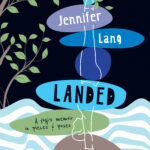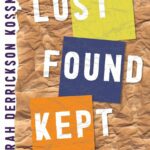MER Bookshelf – September 2024
Curated by Melissa Joplin Higley
 Jennifer Lang, Landed: A yogi’s memoir in pieces & poses, Vine Leaves Press, October 2024, creative nonfiction (memoir)
Jennifer Lang, Landed: A yogi’s memoir in pieces & poses, Vine Leaves Press, October 2024, creative nonfiction (memoir)
American-born Jennifer traces her journey—both on and off the yoga mat—reckoning with her adopted country (Israel), midlife hormones (merciless), cross-cultural marriage (to a Frenchman) and their imminent empty nest (a mixed blessing), eventually realizing the words her yoga teachers had been offering for the past twenty-three years: root down into the ground and stay true to yourself. Finally, she understands that home is more about who you are than where you live. Written in experimental chapterettes, Landed spans seven years (and then some), each punctuated with chakra wisdom from nationally-acclaimed Rodney Yee, her first teacher.
 Cameron Walker, How to Capture Carbon, What Books Press, October 2024, literary fiction (short stories)
Cameron Walker, How to Capture Carbon, What Books Press, October 2024, literary fiction (short stories)
In a dozen luminous stories, How to Capture Carbon brings readers to the water’s edge, where the known world collides with magic and with the mysterious depths of the human heart. In the award-winning “Star, Fish,” a pandemic turns children into sea creatures, while their mother negotiates the delicate balance between grief and growth. In other stories, a woman turns to baking to stem the tide of hopelessness during a natural disaster, and a young man sets off to see the world in a flying coat. Lyrical and dreamlike, these and other stories navigate the seas of a changing climate and the transformative power of loss–and of love.
 Tina Barry, I Tell Henrietta, Aim Higher, Inc., August 2024, poetry
Tina Barry, I Tell Henrietta, Aim Higher, Inc., August 2024, poetry
I Tell Henrietta is a collection of lineated and prose poems, micros and other not-quite-classifiable writing. The pieces bring the reader into the carnivals and beaches of her New Jersey youth. They’ll discover psychics, tattoo artists, aging parents, love fleeting and forever, water and its ability to soothe and smother, and swans in every possible iteration, including a date who showed up dressed as one. The book is also a collaboration with the artist Kristin Flynn, who created several images inspired by the writing.
 Allison Blevins, Where Will We Live If the House Burns Down, Persea Books, November 2024, poetry
Allison Blevins, Where Will We Live If the House Burns Down, Persea Books, November 2024, poetry
Straddling genres―prose poetry, micro memoir, fairy tale, autofiction―Where Will We Live If the House Burns Down is first and foremost the story of a marriage. Borrowing elements from surrealist writers and artists, it explores the effects of chronic illness, disability, and a spouse’s gender transition. All of these issues swirl through the central marital relationship and the daily lives of its two lead characters, Sergeant and Grim―even as the book’s narrator, unreliable and unobjective, increasingly takes center stage. Reminiscent of writers like Sabrina Orah Mark and Sarah Shun-Lien Bynum, this book is as engrossing as it is experimental, traversing complicated domestic and emotional terrain by way of Allison Blevins’ vivid imagination.
 Deborah Derrickson Kossmann, Lost Found Kept: A Memoir, Trio House Press, January 2025, creative nonfiction (memoir)
Deborah Derrickson Kossmann, Lost Found Kept: A Memoir, Trio House Press, January 2025, creative nonfiction (memoir)
How does a psychologist fail to recognize that her intelligent, sensitive, and book-loving mother has created “the worst hoarder house ever seen?” After making the horrifying discovery that her mother had no water in her house for at least two years, Deborah Derrickson Kossmann begins the otherworldly excavation of a childhood home she hasn’t been inside for three decades. Moving back and forth in time, from this surreal nightmare of an archaeological dig to recollecting her past and long buried family secrets, Kossmann seeks to untangle a web of complicated familial relationships. In her lyrical and unflinching quest, she comes to understand what’s been lost, what’s been found and what’s been kept in both her own and her mother’s life.
 Jennifer Case, We Are Animals: On the Nature and Politics of Motherhood, Trinity University Press, September 2024, Creative nonfiction (essays)
Jennifer Case, We Are Animals: On the Nature and Politics of Motherhood, Trinity University Press, September 2024, Creative nonfiction (essays)
When Jennifer Case became pregnant unexpectedly with her second child, she was overwhelmed at the prospect of caring for another child in a society with high expectations and low support for mothers. She sought to reclaim control over, if not her changing body, then at least her rapidly declining mental health. Immersing herself in research, Case learned that the United States has one of the highest maternal death rates among developed countries. One in every five women develops a mental health issue as a result of pregnancy. It became clear to her that in order to address the sexism and isolation mothers face—including the racism that further marginalizes women of color—we must recognize these as social problems that affect us all.
